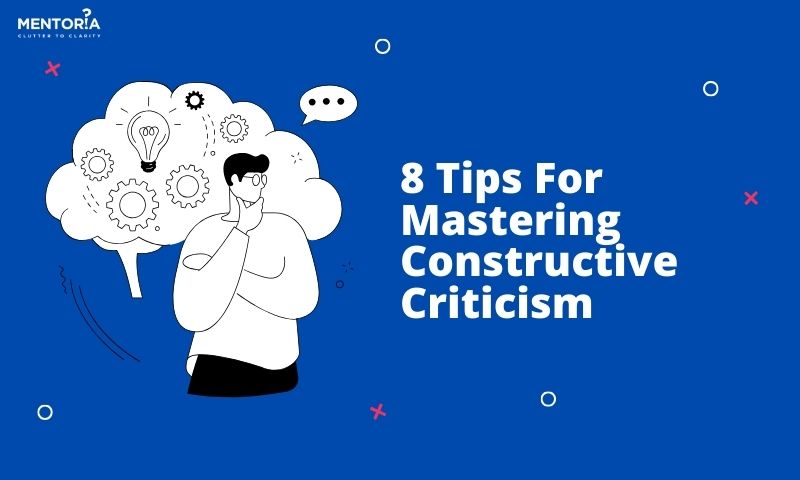8 Tips For Mastering Constructive Criticism

Jump to Section
Let’s talk about that one thing that makes us all a little uncomfortable – constructive criticism. We’ve all been there, receiving feedback on our work, whether it’s a project, presentation, or even our cooking skills! Welcome to a transformative journey where we unravel the art of not just receiving, but mastering constructive criticism. Constructive criticism is akin to a compass guiding us towards self-improvement and growth, but understanding how to effectively navigate this terrain is an art in itself. In this insightful guide, we will equip you with eight indispensable tips that will not only refine how you receive constructive criticism but also empower you to turn it into a catalyst for personal and professional advancement. So, fasten your seatbelt and get ready to turn critique into your most valued mentor on the path to self-betterment!
Embrace The Growth Mindset: Turning Feedback Into Fuel
When it comes to handling constructive criticism like a pro, adopting the growth mindset is your secret weapon. Embrace the belief that you can always improve and grow from any feedback, no matter how challenging it may seem initially. Shift your perspective and see criticism not as a blow to your ego but as a stepping stone toward progress. The idea of a growth mindset was popularised by psychologist Carol S. Dweck. Studies have shown that individuals with a growth mindset, who believe abilities can be developed, are more likely to accept and use feedback effectively to improve their performance. By accepting that constructive criticism helps you develop and refine your skills, you’ll be well on your way to turning feedback into fuel for your personal and professional growth. So, throw away that fixed mindset, and welcome the growth mindset with open arms! Embrace each critique as an opportunity to sharpen your abilities, and watch how it propels you toward greatness.
Listen Attentively, Absorb Wisely
As the saying goes, “Listen twice as much as you speak.” When you receive constructive criticism, it’s essential to listen actively and attentively. Give the speaker your undivided attention, and resist the urge to become defensive. Remember, the person offering feedback has your best interests at heart. Absorb the feedback wisely, without taking it personally. Separate yourself from your work, acknowledging that the critique is about the task and not about you as a person. A study published in the Journal of Applied Psychology found that regular feedback is strongly related to increased job performance. As you listen attentively and absorb the insights, you’ll gain a deeper understanding of areas for improvement and potential blind spots. This active listening approach will help you make the most of each feedback opportunity and drive your growth in leaps and bounds.
Seek Clarifications: Understanding The Why
Feedback often comes with different perspectives and interpretations. If you find yourself puzzled by certain aspects of the feedback, don’t hesitate to seek clarifications. Constructive criticism is meant to be a two-way street, fostering open communication and understanding. Politely ask for specific examples or further explanations to grasp the underlying reasons behind the feedback. This will not only clear any doubts but also demonstrate your willingness to learn and grow. Seeking clarifications shows that you value the feedback and are committed to making positive changes. Embrace curiosity, and transform uncertainties into valuable insights that will empower you to enhance your skills and performance.
Emotions In Check: Don’t Let Feedback Sting
Handling constructive criticism can be emotionally challenging, but it’s essential to keep those emotions in check. Avoid reacting impulsively or defensively, as this may hinder the learning process. Take a deep breath, count to ten if needed, and maintain your composure. Acknowledge your emotions, but don’t let them overshadow the opportunity for growth. Remember, feedback is not a personal attack, but rather an opportunity to refine your talents. Embrace a growth-oriented mindset, and you’ll find that feedback becomes a catalyst for improvement, not a source of distress. A study in the Journal of Organizational Behavior demonstrated a positive relationship between emotional intelligence and constructive use of feedback. With emotions in check, you’ll navigate through feedback with grace and resilience, embracing each critique as a valuable step toward self-improvement.
Take Time To Reflect: The Path To Self-Discovery
After receiving constructive criticism, take some time to reflect on the feedback. Use this period for self-discovery and introspection. Consider how the feedback aligns with your goals and values. Assess your strengths and areas for improvement objectively. Engage in deep self-reflection, and you’ll uncover valuable insights that will aid your growth journey. By reflecting on the feedback, you’ll gain a more profound understanding of yourself, your aspirations, and the steps needed to reach your full potential. Research in the Educational Psychology International Journal highlighted that reflective practices lead to improved decision-making and problem-solving. Embrace this reflective process, and you’ll harness the power of self-awareness to become the best version of yourself. With each moment of introspection, you’ll equip yourself with the tools to conquer any challenge and achieve success.
Transforming Feedback Into Actionable Steps
Feedback without action remains just words. To make the most of constructive criticism, transform it into actionable steps. Identify specific areas for improvement and break them down into achievable goals. Create a plan of action, setting timelines and milestones. Treat feedback as a roadmap to success, guiding you toward continuous growth and development. For instance, a study in the Journal of Educational Psychology demonstrated that feedback aimed at specific skill development significantly enhanced performance. As you take these actionable steps, you’ll witness your progress firsthand, boosting your confidence and reinforcing the value of constructive criticism as a driving force for success. Embrace the power of implementation, and you’ll transform feedback into tangible results, propelling you closer to your goals with each stride.
Seek Support And Encouragement
Remember, you’re not alone on this journey of growth. Seek support and encouragement from mentors, colleagues, or friends. Share your feedback and your plan of action with someone you trust. Having a support system can provide valuable insights, encouragement, and motivation to keep going, even when the road gets tough. Embrace the power of camaraderie, and you’ll find that handling constructive criticism becomes a shared endeavour, where you uplift and inspire each other to reach new heights. Surround yourself with cheerleaders who believe in your potential and celebrate your progress. With this support network, you’ll conquer challenges with confidence and make the most of every feedback opportunity, emerging stronger and more resilient with each stride.
Cultivate A Growth-Oriented Feedback Culture
In addition to mastering how to handle constructive criticism personally, it’s equally vital to cultivate a growth-oriented feedback culture in your workplace or personal life. Encourage open communication and create a safe space for giving and receiving feedback. Emphasise that constructive criticism is not about fault-finding but an opportunity for mutual growth and improvement. Lead by example and demonstrate the power of embracing feedback gracefully. Acknowledge and appreciate individuals who take the initiative to provide constructive feedback, fostering a culture of continuous learning and development. By cultivating a growth-oriented feedback culture, you’ll inspire others to adopt the same mindset and collectively contribute to a thriving environment of self-improvement and progress. Remember, a culture that embraces feedback is a culture that thrives, and you can be the catalyst for positive change!
Learn To Receive Criticism With Mentoria!
By embracing the growth mindset, actively listening, seeking clarifications, managing emotions, reflecting, transforming feedback into action, and seeking support, you’ve unlocked the key to personal and professional growth. Constructive criticism is no longer a daunting obstacle but a valuable opportunity to enhance your skills and achieve excellence. Embrace each feedback as a stepping stone toward greatness, and you’ll be amazed at how far you can go. As you navigate through life’s challenges with an open heart and an unwavering commitment to growth, remember that success is within your grasp. So, go forth and conquer your dreams, armed with the power of constructive criticism and a determination to be the best version of yourself!
We’re here to provide you with all the help! Kick-start your journey with Mentoria and discover the right fit for you. Feel free to call us to speak to our career mentors and choose the right guidance plan that suits your needs.
Mentoria’s career guidance programme enables you to choose your perfect fit from 3 streams, 850+ courses, and 12,000+ careers, and discover what will bring out the best in you.









